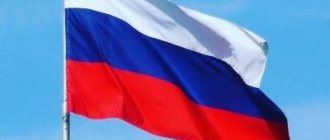Preparatory group - “We are patriots”
Children 6-7 years old are essentially school-age children. Their ability to listen carefully (as well as hear) allows them to have deeper and more thoughtful conversations. When talking with children in the preparatory group, the teacher encourages them to analyze and reason. Children of six years old have very sensitive feelings. They respond vividly to stories about the exploits of heroes and the sorrows of war. When talking with older children, you need to be extremely tactful. In a conversation about the Great Patriotic War, the emphasis should be on the feat of the people, their unity and courage, but not on the personality and nationality of the enemy. When talking about the exploits and glory of the Russian (Soviet) people, it is unacceptable to touch upon the honor of representatives of other nationalities. This can lead to national conflicts, both in kindergarten and outside its walls. Delicacy, a sense of tact, together with the conviction of the teacher, are the key to correct and effective education.
Patriotic education in preschool educational institutions
Younger ages and folklore
Folk culture – what is it? How is she vaccinated? You cannot say to a child: “Love, this is your culture.” It is absorbed from infancy along with folk games, nursery rhymes, and sayings. With good Russian folk tales and cheerful characters - this is how patriotic education begins among children of primary preschool age. In routine moments (washing, walking, getting ready for bed), the teacher skillfully weaves elements of Russian folk art so that the little citizen already begins to feel like a part of his people.
Sports-patriotic approach to education
Senior group – flag, coat of arms, Russia
In the older group, patriotic education takes on a permanent character. Regular conversations are supported by the work of specialist teachers (art, physical education, music). The work of the music director plays a big role here. During music classes, children become closely acquainted with Russian folklore, which gives them a lot of pleasant impressions. Joint preparation of national holidays is not just entertainment for children. This is a close connection to the native culture, familiarity with traditions. At this age, children are given the concepts of “State”, “coat of arms”, “flag”, “anthem”. The list of conversations on civic and patriotic education includes conversations on environmental topics. That protecting the environment is our main task as citizens and patriots of our country. As part of learning about your region, you study the climate. Flora and fauna of the area. According to the calendar, conversations are held about Gagarin's flight and the Great Patriotic War.
